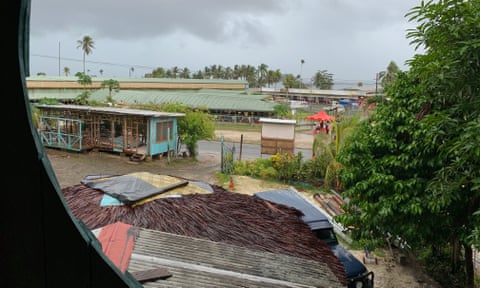For six years Shamindan Kanapathi has been lying to his parents.
Since 2013 the Sri Lankan refugee has been telling his mother and father he successfully made it to Australia and resettled safely in a new life. Only his siblings know that the 28-year-old has spent the entire time detained on Manus Island.
“I don’t want [my parents] to know,” Kanapathi tells Guardian Australia in Manus Island’s main town of Lorengau. “They don’t know much about Australia … Sometimes I take some photos and say it’s of Australia.
“They feel really sorry for me, and it’s very hard when I speak to them; they keep asking what’s happening. They ask about my future.”
Kanapathi is not alone. There are several refugees in Papua New Guinea maintaining the heartbreaking lie.
Omar Jack was 18 when Australia sent him to Manus Island in 2013, after he fled the Darfur region of Sudan.
“I don’t tell them because I’m sure if I tell my mum about what’s going on, she will never be OK. You know, mum’s mum,” he says.
Jack is also burdened by the fact that he, the eldest son, fled Sudan with the plan to bring his family out to join him when he got to Australia.
“Maybe I will tell them one day, but not at this stage,” he says. “But it’s been six years and I didn’t achieve anything, not even for myself, forget about my family.”
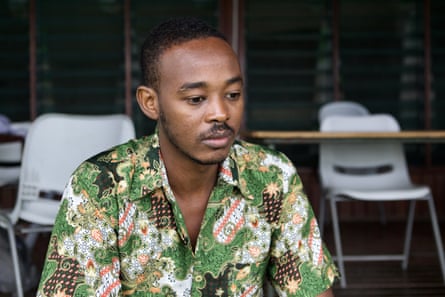
‘Someone has to decide everything for me’
Jack and Kanapathi are among the fewer than 140 refugee men still on Manus Island, detained under Australia’s offshore processing regime under which thousands were sent to Papua New Guinea and Nauru in a bid to deter people from seeking asylum in Australia by boat.
Now entering its seventh year, Australia’s greatest modern controversy is winding down, but the loose ends left behind are devastating. In six months the PNG government intends to take control of the services for the remaining refugees. They are some of the most complex cases, stuck in tropical purgatory amid a wary local population.
Manus province locals were never consulted about what they call “the project”.
TimelineDetention on Manus Island
Show
Julia Gillard's Labor government reopens detention centre – not used since 2004 – and the first 19 asylum seekers arrive from Christmas island.
A UNHCR report finds every asylum seeker on Manus displays signs of anxiety and depression.
New Labor prime minister Kevin Rudd announces people who seek asylum by boat will never be settled in Australia, with all sent to Manus or Nauru.
Three days of violence leaves 70 detainees seriously injured, with some shot by police, stabbed and with their throats slit. Iranian detainee Reza Barati is murdered after security guards inflict fatal head injuries during the riot.
Iranian Hamid Kehazaei dies after a delayed medical evacuation to Australia, as a treatable bacterial infection develops into septicaemia.
More than 500 men begin a two-week hunger strike in protest against conditions on the island. Two stitch their lips together, three swallow razor blades and collapsing strikers have to be forcibly removed by security.
A Guardian investigation reveals widespread failings in the healthcare services provided by IHMS in detention centres, including Manus Island.
A PNG woman employed by Transfield alleges she was raped by Australian colleagues inside the centre. The alleged perpetrators are flown out of the country.
Papua New Guinea supreme court rules the detention centre is illegal and unconstitutional and must be closed.
Australia confirms Manus detention centre will close but says none of the 854 men still there will be resettled in Australia.
Sudanese refugee Faysal Ishak Ahmed dies after six months of suffering numerous blackouts, falls and seizures inside the detention centre.
PNG immigration officials confirm the centre will close on 31 October, and tell detainees to 'consider their options'. Over the following months basic services are shut down around detainees, to encourage them to leave.
The Australian government settles a class action, paying $70m compensation to more than 2,000 detainees for illegal detention and mistreatment, but denies any liability.
Iranian asylum seeker Hamed Shamshiripour is found dead, having taken his own life. His friends say they pleaded with the Australian government to provide treatment for his mental health problems.
Twenty-five men leave Papua New Guinea for the US under a resettlement deal between Australia and the US. The total number to be transferred is still uncertain, with the US under no obligation to take a set amount.
A formally recognised refugee dies in Lorengau hospital.
A week before it's due to close, it’s revealed more than 600 detainees are refusing to leave the centre, citing fears for their safety in Lorengau.
PNG police threaten and hit men as they drag them out of the decommissioned Manus Island detention centre. Up to 60 refugees and asylum seekers are left without a place to stay as the new accommodation is still not ready.
58 refugees accepted for US resettlement leave PNG. Somalis and Iranians are excluded due to Donald Trump's travel ban.
Another 18 refugees leave PNG for resettlement in America. The UN refugee agency warns those left behind show 'a pervasive and worsening sense of despair'.
The father of three dies after jumping out of a moving vehicle in the third apparent asylum seeker suicide on Manus in less than a year.
Amid a worsening health crisis, at least eight men transfer from the immigration facility on Manus to its equivalent in Nauru.
The Kurdish Iranian writer wins both the $25,000 non-fiction prize at the Victorian premier’s literary awards and the $100,000 Victorian prize for literature for his debut No Friend But the Mountains, composed one text message at a time from within the Manus detention centre.
Doctors are given more power to decide whether asylum seekers held in offshore detention should come to Australia for medical treatment.
Coalition government accused of failing to explain why Paladin was awarded offshore detention security contracts through closed tender.
An employee of the government’s contractor on Manus is charged with sexual offences against two PNG women.
Paramilitary police unit dispatched to refugee centre amid a massive rise in self-harm and suicide attempts following despair over the re-election of Australia’s Coalition government in May.
An asylum seeker sets himself alight in his room. PNG police say they will charge him with arson and attempted suicide.
“This place is not like other communities, Manus Island has been isolated for a long time, so it’s hard for them to accept someone coming from the outside,” Kanapathi says.
“The thing is the Australian government always said [we] are criminals and [we] are bad people. So they’ve been given a bad opinion about us before we came and got to know each other.”
The refugees say most people are kind to them but also describe drunken abuse and violence at the hands of locals who are jealous of the Australia-funded housing, food and healthcare, off limits to them.
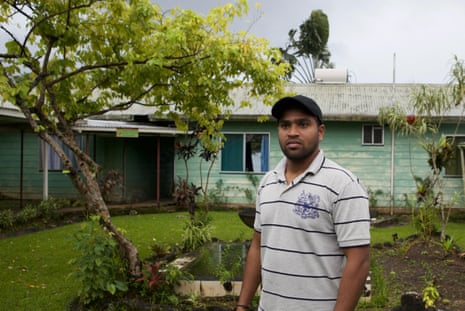
“Someone always tells me what time I go to eat, what time I get my tablet, someone has to decide everything for me – it’s not a freedom,” Kanapathi says.
“Even if you’re in Australia … if you don’t have your rights it is going to be hell for you.”
When Guardian Australia visits Lorengau, the mornings begin with torrential rain, soaking the wide empty streets around the central market where mostly women sell fresh produce, fish and nuts. Huge sea turtles, stripped of their shells, are spread on the grass. People pick their way around puddles and flooded drains, sit under the eaves talking or chewing betel nut.
Asked what they think of the project, many shrug.
“The government decided to give [Australia] the naval base,” says one man. He gestures at a trio of refugee men walking across the road. “They’re here now, in our community.”
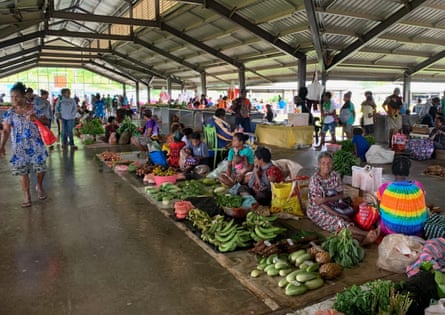
Manusians are doing what they can to tolerate and adapt, to take the jobs not filled by hundreds of Australians, to hold on to their island culture while welcoming people from very different ones.
In the market a couple of refugees stop to talk near the entrance to the fish section. A PNG man asks them to move with an air of weary tolerance.
The men apologise, shift over and continue their discussion of who has left Manus recently, doing a quick headcount. Some share recent stories of locals threatening black magic against them, or of a recent rejection for US resettlement.
Most of the men stay inside their rooms, sometimes for up to six days at a time, some eating just once a day, because if you eat more than that you have to find something to do with your energy, and there is nothing to do.
At a small supermarket a young Afghan man sits on the edge of a fridge. He’s waiting for his friend and watching the late afternoon traffic of people shopping. He was rejected for US resettlement a few years ago and now there is nothing but the daily pattern of life. Everything is the same here, he says. It doesn’t change. Entering his seventh year on Manus Island, he says it’s been too long, but he sounds resigned.
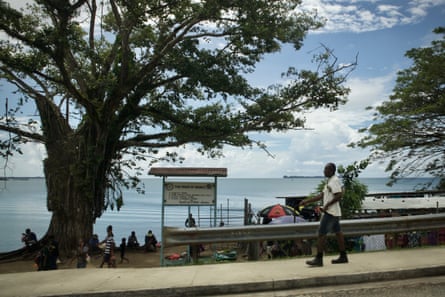
‘The fabric of our society was destroyed’
It has been too long for everyone in Lorengau, the town without choice.
Locals talk of the days it began: with the Australian army and navy brought in to their remote town, intimidating most people from asking any questions.
Then the refugees began arriving from Christmas Island, taken off boats intercepted on their way from Indonesia to seek asylum in Australia. At peak there were more than 2,000 incarcerated inside the purpose-built facility inside the Lombrum naval base, a short boat ride around the nearest headland.
An epidemic of tragedy followed: mental illness, self-harm, suicides, murder, assaults and mass hunger strikes.
Then in late 2017, after a brutal 24-day standoff brought the centre to a close, the men were moved closer to town and given more freedom to walk around.
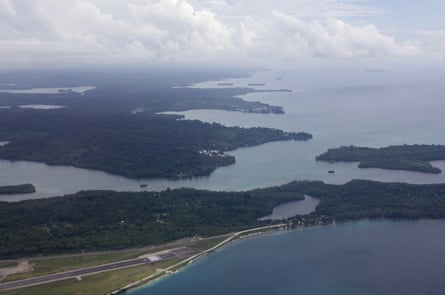
They live in three compounds – East Lorengau transit centre, Hillside Haus, and West Lorengau. Each is on the outskirts of town, down long dirt roads leading into thick jungle, the entrances to the centres manned by Paladin guards.
They accept no visitors, and the refugees must abide by a 6pm to 6am curfew. If they want to find work, or organise travel, they must go through JDA Wokman, the logistics contractor.
As numbers dwindle due to medevac transfers, Port Moresby transfers and US resettlement, authorities appear to be consolidating people into East Lorengau.
Some who refused to take part in the refugee process in the early years were given negative determinations as a result, and now beg to have their claims assessed so they can apply for US resettlement.
As they did while in detention, men have formed their own communities based on their homeland.
“We love each other, we support each other,” Jack says. “Each one of us has a community and the community is our family. Sadness and happiness we are all together.”
They are also supported by a network of advocates in Australia, mostly older women who some of the men affectionately refer to as “grandmothers”.
Ben Pokarup is a burly local man from an outer island, who has helped the refugees however he can over the years.
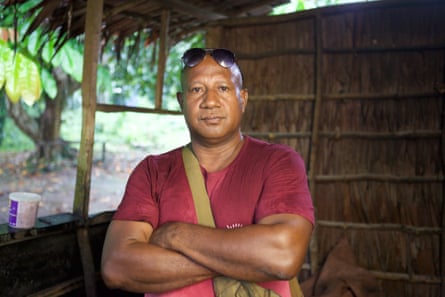
“In Manus, I think, a lot of people are full of hospitality and they sympathise with them,” he says outside his home, a traditional men’s hut just outside town.
“I was enormously sad when they were telling about [their stories], a lot of them are psychologically tormented. You … put yourself into someone else’s shoes.”
But Pokarup says he also has concerns, including for the welfare of local women who forged relationships with some of the refugee men, had children, and are now alone.
“The fabric of our Manus society was also absolutely destroyed because of these connections,” he says.
Hugely controversial contracts, paid by the Australian government, have also caused great division. Pokarup says Australians get paid as much as 10 times what a local earns working for a company which takes its profits back to Australia.
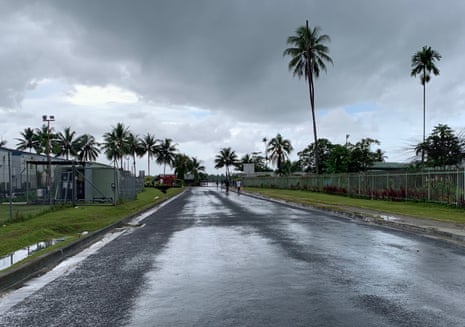
“Because of the economic downturn of the country as a whole, the furthest islands of PNG – as I think we are – live with a lot of disadvantage,” Pokarup says.
“We have no other economic activity, and when Australia leaves Manus, there is hardly any tangible infrastructure left behind.”
Pokarup is also chairman of the Manus tourism board. He says the region’s reputation was destroyed in an instant, but he hopes people will come to visit again soon.
“I don’t think our leaders were in the right frame of mind when the project came,” he says. “They shut their mouths up, and the actions Australia took were a new colonialist approach, and made some of us … I don’t know what to say, angry or sad.”
A town under pressure
Healthcare is a lightning rod for the concerns of people like Pokarup. Australia has funded a clinic, run by Pacific International Hospital, exclusively for the refugees. But it operates only in business hours and is frequently accused of abrogating its duty of care, shunting patients to the Lorengau hospital.
“I actually confronted the PIH doctors when two or three of our guys were up at the hospital,” says Pokarup, referring to some refugees.
“They were left up there on Friday night and didn’t go back until Sunday. They occupied three of the beds for emergency, and one of the side rooms. What if one of the Manus citizens [needed it]?”
Lorengau’s hospital is grim. Perched at the top of a hill, it is a series of worn-down, brightly painted weatherboard buildings connected by covered walkways.
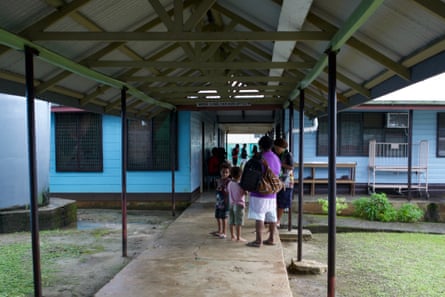
Hand-painted signs label the dentistry, operating theatre, dispensary and emergency rooms. The emergency department has four cupboard-sized stalls separated by thin walls and doorways covered by curtains. Every one is occupied, and people sit outside, under the covered balcony, some attached to drip stands.
What this place could have done with the $2m a month Australia has given PIH.
“They have their own problems to look after and you see the conditions,” says Kanapathi. “The Australian government should have paid that money to the local hospital and built it up, so it would be fit for the refugees and the local people.”
A sign on the outskirts of Lorengau proclaims the town as “the pride of Manus” and the first listed quality is “a healthy mind”.
Last month the number of suicide attempts and acts of self-harm since the shock Australian election result reached 100. A young man set himself on fire inside his room at asylum seeker accomodation, prompting the local police to announce he would be charged with arson and attempted suicide.
A national PNG newspaper published a reader’s letter decrying that all this self-harm was affecting their children, so if refugees wanted to set themselves on fire, PNG could help them burn.
It’s quieter now in Lorengau, and the acts of self-harm have slowed.
There is a wary calm among the people from very different backgrounds, thrown together through no choice of their own, but no one – refugees and locals alike – knows why these men are still here.
On Friday the PNG prime minister, James Marape, demanded a timeline from Australia to end the regime “as soon as possible”.
Had Labor won the election and followed through on its pledge to accept New Zealand’s offer to resettle refugees, it could have been over within a year or two.
“Before the election, everywhere I went people asked me [what can we do to help] and I said don’t vote for Liberal,” says the Kurdish refugee and writer Behrouz Boochani.
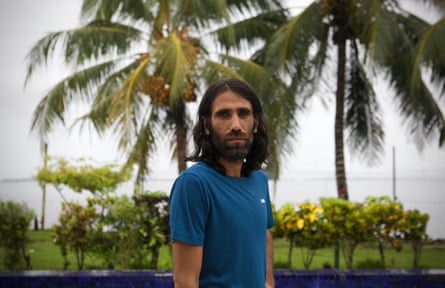
“Now … it’s over. It’s so so sad a story. Really, when I look at the refugees, I feel deeply sad when they share their stories with journalists. We’ve done this a million times. A million times.”
Kanapathi and two fellow Sri Lankan refugees want people to know they don’t want to come to Australia.
“Any other country we can accept, we need freedom,” one of the refugees, who doesn’t want to be named, says. “A few people refuse [to go to the US] because they have family [in Australia] but otherwise all of them they just need to get the freedom.”
Kanapathi says he would happily agree never to come to Australia if he was allowed to go to New Zealand.
“Every Australian must understand that no refugee came to Australia thinking Australia is heaven,” he says. “They just want to get away from their problems and they need a safe place.”
